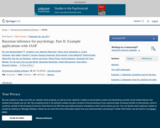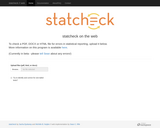
Bayesian hypothesis testing presents an attractive alternative to p value hypothesis testing. Part I of this series outlined several advantages of Bayesian hypothesis testing, including the ability to quantify evidence and the ability to monitor and update this evidence as data come in, without the need to know the intention with which the data were collected. Despite these and other practical advantages, Bayesian hypothesis tests are still reported relatively rarely. An important impediment to the widespread adoption of Bayesian tests is arguably the lack of user-friendly software for the run-of-the-mill statistical problems that confront psychologists for the analysis of almost every experiment: the t-test, ANOVA, correlation, regression, and contingency tables. In Part II of this series we introduce JASP (http://www.jasp-stats.org), an open-source, cross-platform, user-friendly graphical software package that allows users to carry out Bayesian hypothesis tests for standard statistical problems. JASP is based in part on the Bayesian analyses implemented in Morey and Rouder’s BayesFactor package for R. Armed with JASP, the practical advantages of Bayesian hypothesis testing are only a mouse click away.
- Subject:
- Psychology
- Social Science
- Material Type:
- Reading
- Provider:
- Psychonomic Bulletin & Review
- Author:
- Akash Raj
- Alexander Etz
- Alexander Ly
- Alexandra Sarafoglou
- Bruno Boutin
- Damian Dropmann
- Don van den Bergh
- Dora Matzke
- Eric-Jan Wagenmakers
- Erik-Jan van Kesteren
- Frans Meerhoff
- Helen Steingroever
- Jeffrey N. Rouder
- Johnny van Doorn
- Jonathon Love
- Josine Verhagen
- Koen Derks
- Maarten Marsman
- Martin Šmíra
- Patrick Knight
- Quentin F. Gronau
- Ravi Selker
- Richard D. Morey
- Sacha Epskamp
- Tahira Jamil
- Tim de Jong
- Date Added:
- 08/07/2020
